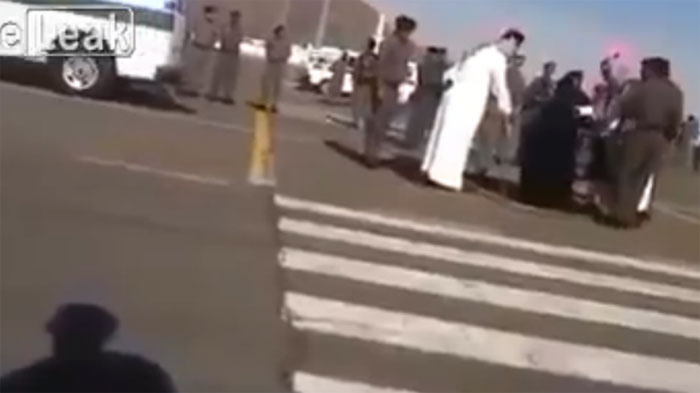Saudi Arabia’s Beheadings Are Public, but It Doesn’t Want Them Publicized

Saudi Arabia, a world leader in beheadings, has a policy of carrying out the gruesome punishment in public to serve as a warning for other citizens. But as the arrest of the man who filmed a recent beheading demonstrates, the kingdom is much more wary of publicizing its brutal methods abroad.
The video, posted online on Saturday, Jan. 17, shows security officers subduing a black-clad woman pleading in Arabic before an executioner raises his sword and severs her head. Identified by the Saudi government as a Myanmar national, the woman was convicted by a court in Riyadh of murdering her husband’s daughter, and she was beheaded in Mecca.
On Sunday, Saudi police issued cybercrime charges against the unnamed policeman who took the video. Analysts say his arrest is difficult to square with Saudi Arabia’s official stance that beheadings are an appropriate punishment under Islamic law, and it likely reflects the government’s sensitivity to mounting criticism and uncomfortable parallels with the Islamic State extremist group.
Although Saudi Arabia is a key ally in the U.S.-led coalition against the Islamic State, it has come under fire for carrying out the same sort of brutal punishments as the militants.
Public beheadings are a routine way for Riyadh to assert power, said Saudi scholar Madawi Al-Rasheed, a visiting professor at the London School of Economics and Political Science’s Middle East Center. But, she said, the kingdom seems uncomfortable when footage of beheadings circulates internationally, “especially at a time when its competitor, IS, is doing the same thing.”
“It is just one example of Saudi contradictions,” Al-Rasheed said.
In another, Riyadh condemned the Charlie Hebdo attack in Paris the same week that the Saudi government publicly flogged Saudi blogger Raif Badawi, who was convicted of disrespecting Islam on a now-defunct liberal website he co-founded.
“Clearly, Saudi Arabia is pretty ashamed at having its brutality exposed,” said Sarah Leah Whitson, executive director of Human Rights Watch’s Middle East and North Africa division. She said the punishments are meant for the kingdom’s domestic public — much of which supports beheadings as sentences — and not for international viewers.
In the case of the videotaped beheading, Whitson predicted the Saudi government would charge the policeman with harming the reputation of the kingdom, “which is so ironic.”
Lina Khatib, director of the Carnegie Middle East Center in Beirut, said Riyadh likely is mindful of the international backlash after flogging Badawi. That, too, has drawn parallels to the Islamic State’s violence at the same time Saudi Arabia seeks to be seen as a credible ally of America against extremism and radicalization. But, Khatib said, the Saudi arrest of the policeman “is only serving to further confirm the absence of freedom of expression in the country.”
Saudi Arabia executed 87 people in 2014 for crimes including rape, murder, armed robbery, and drug trafficking, and it has already beheaded at least 10 people in 2015.
Whitson said the international community should ramp up pressure on Saudi Arabia to end its brutal punishments, which she said have served as a model for the Islamic State.
“We’re not going to be able to affect how ISIS carries out its punishments,” Whitson said, “but we can affect how our ally Saudi Arabia does.”
Source: Foreign Policy

